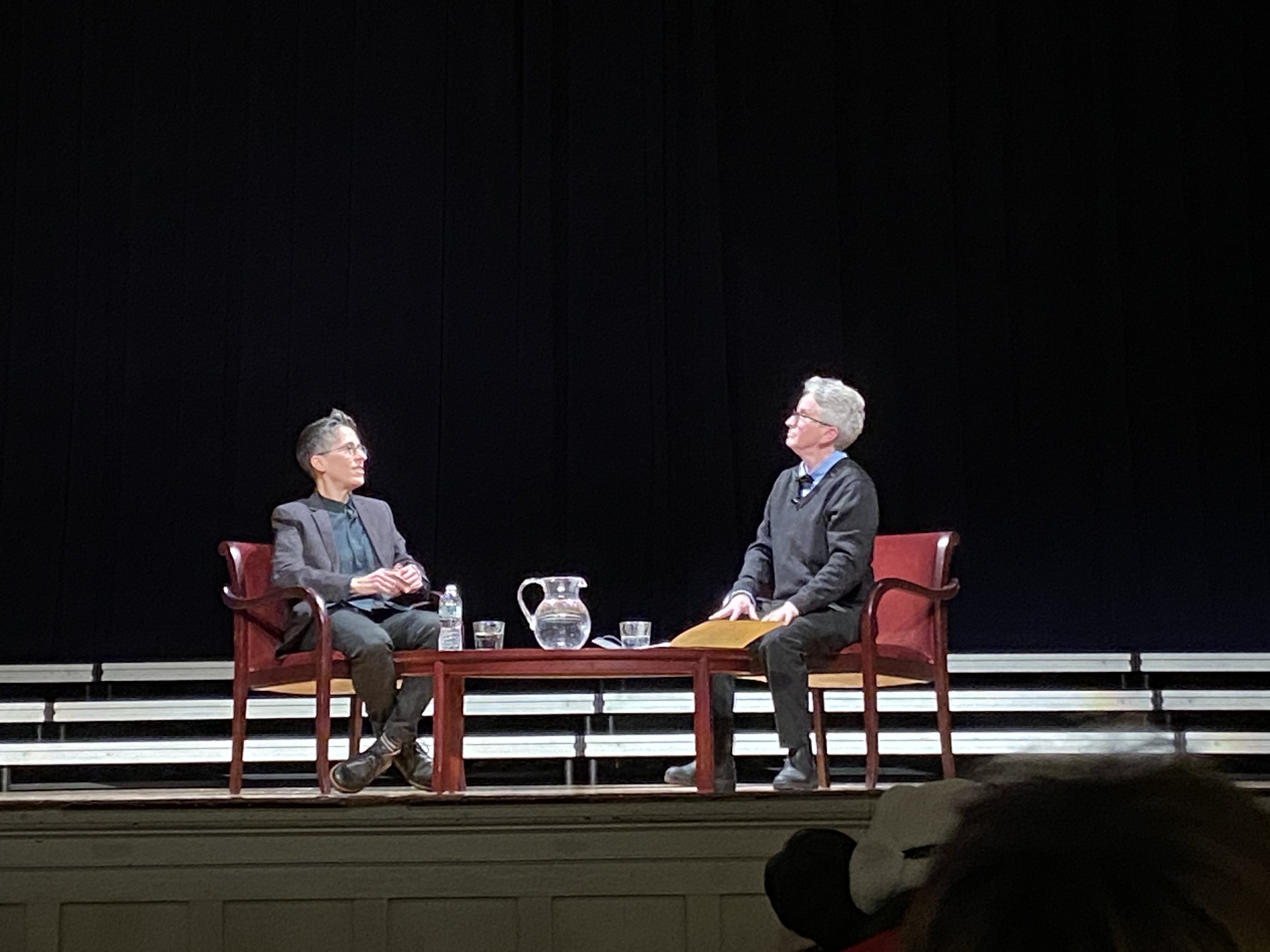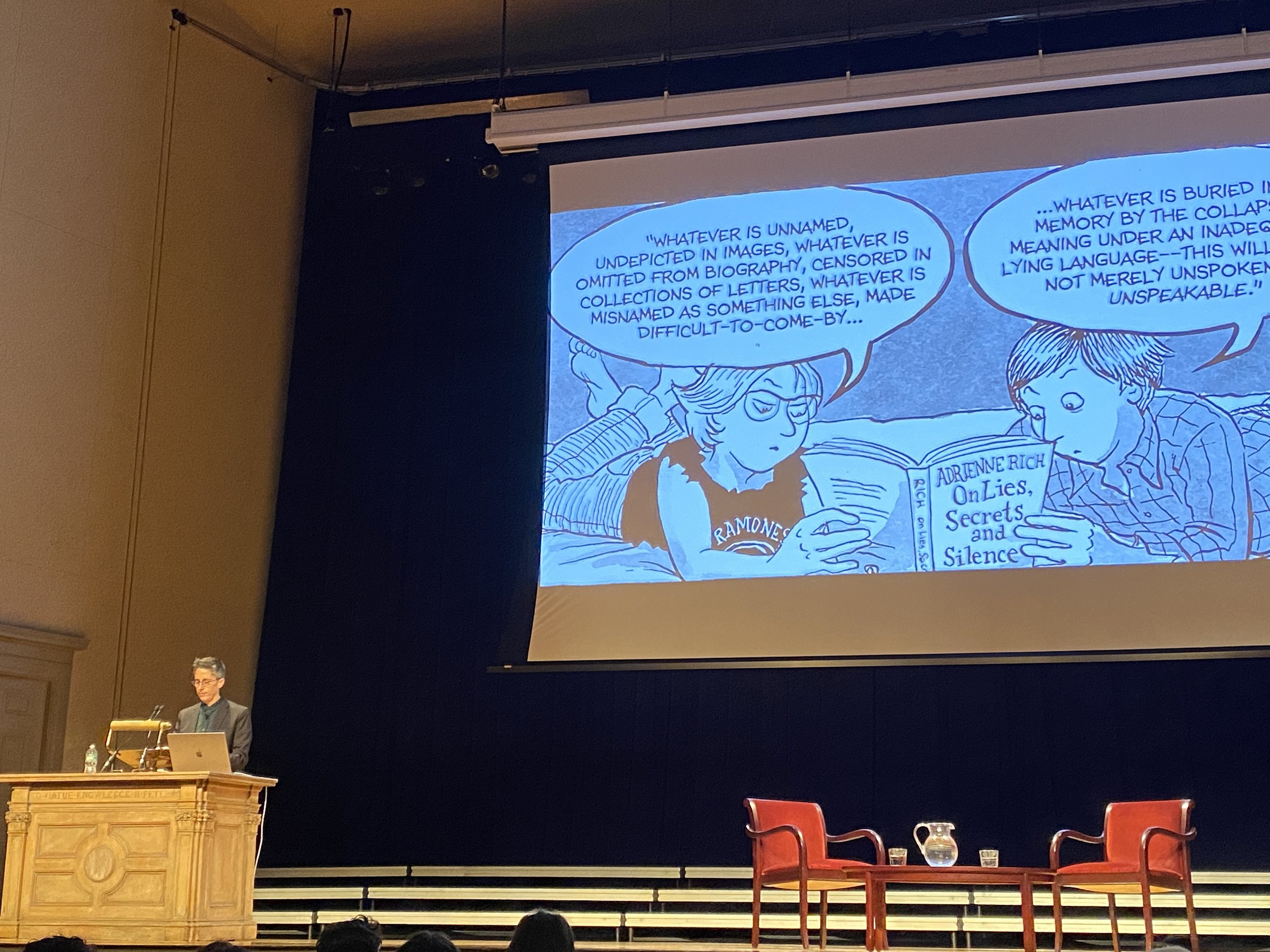Photos by Emma Quirk ’26.
Left: Alison Bechdel, left, and Smith College Archivist Nanci Young, right, chatted about Bechdel’s work. Right: Famous lesbian cartoonist Alison Bechdel spoke at Smith College on March 2. She discussed intertextual references in her work and queer politics.
By Emma Quirk ’26
Staff Writer
On Thursday, March 2, 1,300 people gathered in Smith College’s John M. Greene Hall to listen to award-winning cartoonist and lesbian icon, Alison Bechdel. According to Bechdel, it was her fourth time speaking at Smith, and the largest, most highly attended venue yet.
For some, this was their first time engaging with Bechdel, while for others it was one of many. “Bechdel is very much a celebrity of my childhood … I was pretty young when I was reading her ‘[The] Essential Dykes to Watch Out For’ … and my mother is a superfan,” Saira Sukthankar ’26 said. After attending this event, she felt as though she had “developed an independent relationship with [Bechdel’s] work.”
Throughout her talk, Bechdel discussed her various books and the inspiration behind them. Beginning with “The Essential Dykes to Watch Out For,” her first collection of comic strips that followed a group of lesbian friends, she explained how she stumbled upon Adrienne Rich’s writing in college. Inspired by Rich’s exploration of “the way lesbians were historically rendered invisible,” she began this project. “I didn’t see people who looked like me or my friends reflected anywhere in our culture. We were literally undetected, omitted from the record,” Bechdel said.
As she continued writing and drawing, her work became more political, and she began exploring how being out as a lesbian is inherently political. She claimed it “felt like sort of a political act, even a radical act,” to be out and proud about her identity. However, her comics didn’t originally intend to be political statements. “In the early 1980s, I wasn’t addressing people who thought I didn’t exist. Or shouldn’t exist. It was just for me and for my friends, for ourselves,” Bechdel said.
Lia Di Lisio ’26 was excited to hear that the original intended audience was Bechdel’s friends. “I enjoyed learning that ‘[The Essential Dykes to Watch Out For]’ was created for her and her friends. This work gave us comedy, representation and exposure to the inherent politicization of queerness,” Di Lisio said.
Bechdel shared the way her worldview shifted after she came out as a lesbian. “Once I came out and found myself outside of that [white middle-class] world … It was amazing to suddenly have this perspective. You couldn’t see how things worked when you were on the inside, but from the outside, it was suddenly revealed it was like I woke up from a dream. And I was becoming woke,” Bechdel explained. She acknowledged the queer people and movements before her that allowed her to live her life in the way she has. “‘Fun Home’ and [‘Are You My Mother?’] … are both ways my life was made possible by liberation movements of the 1960s — women’s liberation and gay liberation — which both came out of the civil rights movement,” Bechdel said. She stated that “Fun Home” and “Are You My Mother?” are also about “how [her] parents had missed out on much of the possibility and promise of those things.” Her existence was possible because of the previous generation, and she has, in turn, opened up doors for the generations after her.
This notion resonated with students, who were able to realize their own position as queer people in our current society. “Although it shouldn’t surprise me, I didn’t expect her to be so politically moved. I forget that the queer people of the generations before me didn’t really have a choice but to be politically moved,” Sydney Bloom ’26 said.
Bechdel’s presentation emphasized how individual contributions to visibility, like her comic strips, are important to improving the world for future generations. “People like her have helped set up a society where I can be proud of who I am,” Di Lisio said.
Toward the end of her presentation, Bechdel came back to Adrienne Rich. Bechdel explained that she drew on a paper scroll each day to get out of an inspiration rut, and thought of the words “Transcendental Etude.” She could not remember right away where she knew this from “but it was deeply familiar.” It is the title of a poem by Adrienne Rich, one that had been “pretty formative” to college-aged Bechdel.
“I realized that [rediscovering Transcendental Etude] actually helped the ending of my book, my final chapter, a quote from her final stanza. [Rich is] not concerned with virtuosic display, or the narcissistic longing for eternity, she’s interested in a different kind of creative. One that involves the musings of a mind, body,” Bechdel said. Like the students who see Bechdel’s books as formative for them, Bechdel was constantly inspired by Rich.
After her presentation concluded, Bechdel was joined on stage by Nanci Young, the Smith College archivist. Young asked about the intention of including historical references in her work, such as political t-shirts and pins. “I very consciously thought about what I was doing as a kind of archive,” Bechdel said. In this discussion of archives, Young encouraged audience members to visit the Smith archives and see Bechdel’s work that is preserved there. Once this portion ended, there was a book signing, and the night was over.
Overall, Sukthankar and Di Lisio left the talk feeling content and inspired. “She used the space really well, with large projections of her work, which she worked into her talk seamlessly. She was funny and interesting,” Sukthankar said. Bechdel “is truly a role model,” Di Lisio stated.
“The best way to describe the way I felt during the event is full of love,” Bloom said. “I would take time to look around and I saw so many different kinds of queer people. The ones that warmed my heart the most were the old lesbian lovers. They were the kind of people who made me feel seen because they reminded me that the love I feel has existed for decades.”


